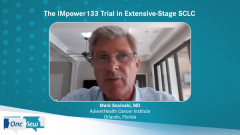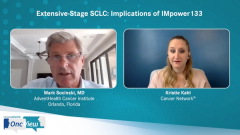
Immunotherapy as First-Line Treatment for Extensive-Stage SCLC
The rationale for adding an immunotherapy agent to frontline therapy for extensive-stage small cell lung cancer and considerations for patient selection.
Episodes in this series

Kristie Kahl: Dr Socinski, what have been the response rates with standard-of-care frontline therapies in patients with extensive-stage small cell lung cancer?
Mark Socinski, MD: The response rates to platinum-based doublets have typically been in the 60%-to-70% range. Most are partial responses. Maybe 10% might be a complete response. But that’s really been our expectation with standard-of-care platinum-based doublets, specifically platinum etoposide.
Kristie Kahl: What is the rationale for adding immunotherapy in this setting?
Mark Socinski, MD: One of the factors that seems to be predictive of a benefit from immunotherapy in lung cancer has been a history of smoking. As we’ve established, this is a smoking-related disease. When you look at tumor mutational burden, which we also think is potentially related to the effectiveness of immunotherapy, these patients have a very high tumor mutational burden. Like other tumors where immunotherapy has been successful—melanoma, bladder cancer, non–small cell lung cancer—small cell would fit into that category. That is the underlying rationale for thinking about adding I/O [immuno-oncology] in this setting.
Kristie Kahl: Which patients would be eligible for immunotherapy in the front line? Does PD-L1 status matter?
Mark Socinski, MD: The trials that have been done have been agnostic to PD-L1. PD-L1 is a bit difficult to measure in small cell lung cancer because of the nature of many specimens we get there. The eligibility for I/O up front in these patients has to do with whether they have comorbid illnesses that would exclude them from immunotherapy. Do they have any interstitial lung disease, autoimmune disease, or other things that would make I/O a contraindication? Most people don’t have those, so most are eligible for I/O in the first-line setting. But we don’t routinely do PD-L1 sustaining in this setting when we’re not sure if it makes a difference.
Kristie Kahl: Has the withdrawal of the pembrolizumab indication for metastatic small cell lung cancer affected treatment options for the extensive-stage small cell lung cancer population?
Mark Socinski, MD: That’s an interesting question. In both pembrolizumab and nivolumab, which were both indicated in third-line treatment of extensive-stage small cell lung cancer, those data were generated prior to the routine use of immunotherapy with first-line treatment. I don’t think the withdrawal of those indications really alters the treatment options, because I/O should be used first line, not third line. I don’t think that really has made a difference in any way, shape, or form.
Kristie Kahl: I know we just mentioned pembrolizumab and nivolumab. What other immunotherapies have been used or tried in this patient population?
Dr. Mark Socinski: What I would call the big four—atezolizumab, durvalumab, pembrolizumab, and nivolumab—have all been tested, all in phase 3 except for nivolumab. Nivolumab was in a very large phase 2 there. It’s interesting that the results of all these trials have been very consistent, which is reassuring. Not all the trials have been statistically positive, but the impact of adding I/O has been pretty consistent across these trials. There’s actually a wealth of information about I/O therapy in the first-line setting.
Transcript edited for clarity.
Newsletter
Stay up to date on recent advances in the multidisciplinary approach to cancer.







































